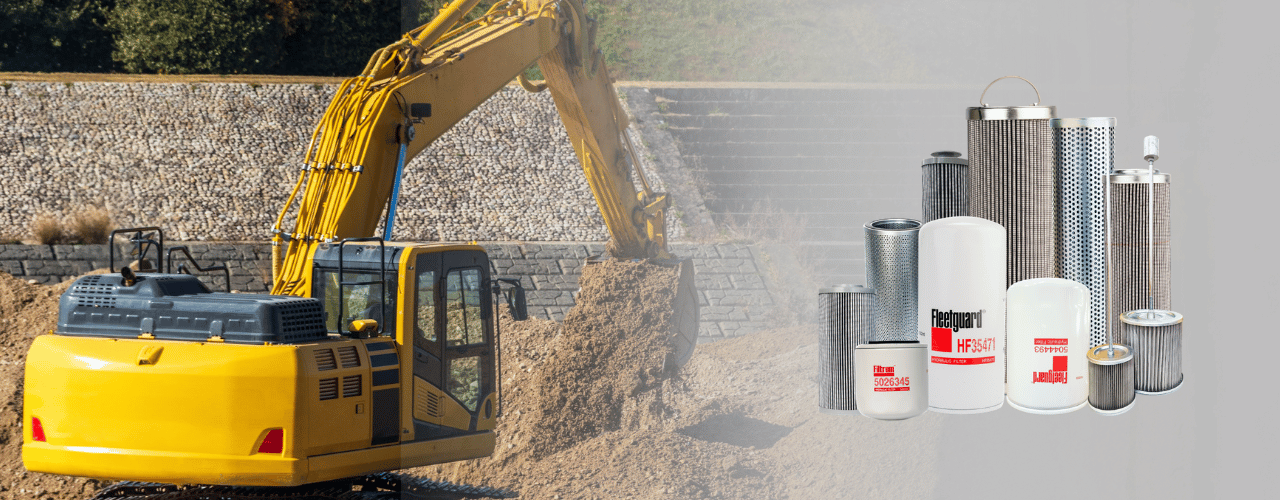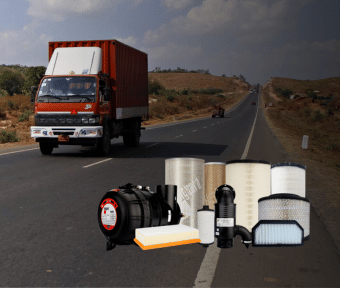Product | 10 Jul 2025
In the realm of engine maintenance and performance optimization, filtration systems play a crucial role in protecting vital engine components and extending equipment life. Among these, fuel filters and lubrication filters stand as essential guardians against contaminants that could potentially cause catastrophic damage.
Understanding the distinct functions and design characteristics of these filtration systems helps equipment owners make informed decisions regarding maintenance schedules and product selection.
This article explores the key differences between fuel and lube filters while highlighting how Fleetguard has established industry leadership in both categories through advanced technology and innovative design.
Fuel Filters: Purpose & Function
Fuel filters serve as the critical barrier between fuel storage systems and sensitive engine components. The primary functions of fuel filters include:
Contaminant Removal
Fuel filters trap and retain various contaminants, including dirt, rust particles, microbial growth, and water that inevitably enter fuel systems during transportation, storage, and transfer processes.
Water Separation
Water in diesel fuel presents a significant threat to injection systems, causing corrosion, cavitation, and promoting microbial growth. Quality fuel filters efficiently separate and collect water molecules from fuel before they reach critical engine components.
Multi-Stage Protection
Modern fuel filtration systems often employ multiple filtration stages, with primary filters capturing larger particulates and secondary filters removing finer contaminants. This staged approach ensures comprehensive protection while maintaining optimal fuel flow rates necessary for proper engine performance.
Flow Regulation
Fuel filters must balance thorough contaminant removal with appropriate flow characteristics to maintain consistent engine performance under varying operational conditions and temperatures.
Lube Filters: Purpose & Function
Lubrication filters focus on maintaining oil cleanliness to protect against engine wear and prolong component life. Their primary functions include:
Particulate Removal
Lube filters remove metal particles, carbon deposits, dust, and other abrasive materials that enter the lubrication system. These contaminants typically result from normal engine wear, combustion byproducts, and environmental infiltration.
Heat Dissipation
Quality lubrication filters help manage the heat generated by engine operation. The filter media and housing design contribute to effective heat transfer, helping maintain optimal oil temperatures and viscosity characteristics.
Chemical Stability
Modern lube filters must withstand exposure to various oil additives and operating temperatures without degradation. Chemical compatibility ensures consistent performance throughout the service interval while preventing filter media breakdown that could introduce additional contaminants.
Extended Service Intervals
Advanced lube filtration systems balance dirt-holding capacity with flow characteristics to enable longer service intervals without compromising protection. This balance directly impacts maintenance costs and equipment downtime.
Key Differences Between Fuel and Lube Filters
While both filtration systems protect engine components, several fundamental differences exist in their design, construction, and operational parameters:
Media Composition
Fuel filters typically employ cellulose, synthetic blends, or fully synthetic media designed specifically for hydrocarbon compatibility and water rejection. Lube filters often utilize more complex composite media structures capable of capturing smaller particles while maintaining higher flow rates and thermal stability.
Pressure Ratings
Lube filters generally operate at significantly higher pressure levels than fuel filters. While fuel systems might operate at 50-100 PSI, lubrication systems commonly function at 60-100 PSI during normal operation but must withstand pressure spikes exceeding 200 PSI during cold starts or operational anomalies.
Filtration Efficiency
Fuel filters prioritize removing particles that could damage injection systems, typically in the 2-5 micron range. Lube filters must capture even smaller wear particles, often down to 10-20 microns, while handling much higher contamination loads over longer service intervals.
Flow Characteristics
Fuel filters must maintain consistent flow rates even at low temperatures when diesel fuel approaches its cloud point. Lube filters must accommodate the varying viscosity characteristics of oil across wide temperature ranges while maintaining protection during critical cold-start conditions.
Why Choose Fleetguard Filters
Fleetguard has established industry leadership in filtration technology through continuous innovation and application-specific engineering. Their comprehensive approach to both fuel and lubrication filtration systems provides exceptional protection across diverse operating environments.
Fleetguard's latest technology represents a significant advancement in fuel filtration and lube filtration. Fleetguard's technological advantages stem from their comprehensive understanding of equipment requirements across multiple industries. Their engineering approach includes:
- Application-specific design parameters tailored to particular engine models and operating environments
- Rigorous testing protocols that exceed industry standards
- Materials science expertise that ensures compatibility with evolving fuel and lubricant formulations
- Manufacturing precision that maintains consistent quality across global production facilities
Conclusion
The differences between fuel and lubrication filtration systems reflect their specialized roles in protecting modern engines. While fuel filters focus on removing contaminants and water from hydrocarbon fuels, lube filters must manage the more complex challenges associated with maintaining oil cleanliness under high-pressure, high-temperature conditions.
With latest technologies, Fleetguard continues to set industry standards for filtration performance, reliability, and value. For comprehensive information about Fleetguard's complete range of filtration solutions engineered for specific applications and operating environments, visit Fleetguard-Filtrum.








